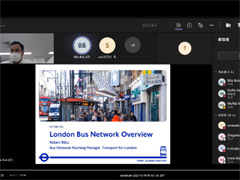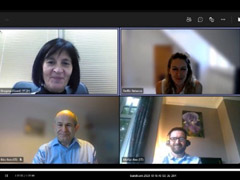- Home
- Technical Cooperation Projects
- Index of Countries
- Europe
- Serbia
- Project for Modernization of Public Urban Transport in the City of Belgrade
- Project News
- Joint Online Session on Public Transport between the City of Belgrade, Serbia and London, UK
Project News
2021-11-18
Joint Online Session on Public Transport between the City of Belgrade, Serbia and London, UK
In the Project for the Modernization of Public Urban Transport in the City of Belgrade (the project), the scope of work includes a technical visit and in-country training sessions in London, UK. Prior to the training in London, an online session (the session) was held jointly with London on October 18 with the aim of improving the operation of public transportation in Belgrade at an early stage and deepening the understanding of the on-site training to follow.
Participating organizations
City of Belgrade: Secretariat for Public Transport (SfPT)
London: Transport for London(TfL)
Japan: JICA and JICA Project Team
 Screenshot of the session
Screenshot of the session
 Screenshot of the session
Screenshot of the session
Overview of the Session
Transport for London (TfL) is the public transport authority in Greater London, which consists of the City of London and 32 boroughs, and is responsible for implementing transport policies and managing the integrated transport system which includes subway and buses. In this session, we collected information on bus operating plans and the system used by TfL to contract services with multiple private bus operators.
Efforts regarding bus operation plans and transportation contracts with bus operators in the Greater London are following.
1. Bus Operating Plan: TfL formulates the routes, frequencies, time, and number of vehicles to be used for bus operations, and detailed operation plans are then developed by each operator. In developing the operation plan, a cost-benefit analysis is conducted using the travel time of users as an indicator. When making changes to the operating plan, other factors such as cost estimation, fare revenue projection, and passenger convenience are comprehensively taken into consideration.
In recent years, TfL has introduced a new system called "EVAL" to reduce the labor and cost involved in the above analysis work. This system enables them to calculate the impact on existing users and the number of new users, as well as to predict changes in waiting time and revenue, by using OD data and various indicators obtained from bus card usage records for collection and analysis. By using these advanced technologies, TfL aims to maintain the high level of user satisfaction.
2. Transportation contracts with bus operators: Buses in Greater London were originally operated directly by TfL, but since 1985 a tendering system has been in place.
As a result of the change from a gross cost contract to a net cost contract in 1995, the quality of the bus service was affected by the deterioration of the excess wait time, which is one of the evaluation indicators of the bus service. As in Belgrade, the contract with bus operators was based on availability payment (Gross Cost), and each operator was paid based on the actual distance traveled, regardless of the fare revenue. However, in 1995, the contract was changed to a Net Cost contract, through which the operator received the fare revenue directly and was therefore assuming the revenue risk in addition to the operational risk. Following the change in the contract structure, there were problems that affected the quality of the bus service, such as the deterioration of the excess wait time, which, as mentioned previously, is one of the principal evaluation indicators of the bus service.
As a result, TfL progressively reviewed their contracting methods from year 2000 and now use a quality incentive contract based on the gross cost contract. Under this contract, a bonus is paid if the service level exceeds a an upper threshold, while a penalty is applied if it falls below a lower threshold. While TfL remains responsible for the fare revenue, a quality incentive contract provides financial incentives to operators to improve service levels, and as a result, customer-oriented indicators such as excess wait time have been improved.
As mentioned above, this session provided many lessons learned from TfL's efforts on measures and issues that should be considered in the future to improve public transport operations in Belgrade. We will continue our activities to reflect the knowledge gained through repeated sessions and site visits from third countries to improve the public transport management in Belgrade.
- About JICA
- News & Features
- Countries & Regions
- Our Work
- Thematic Issues
- Types of Assistance
- Partnerships with Other Development Partners
- Climate Change / Environmental and Social Considerations
- Evaluations
- Compliance and Anti-corruption
- Science and Technology Cooperation on Global Issues
- Research
- JICA Development Studies Program / JICA Chair
- Support for the Acceptance of Foreign HRs / Multicultural and Inclusive Community
- Publications
- Investor Relations
